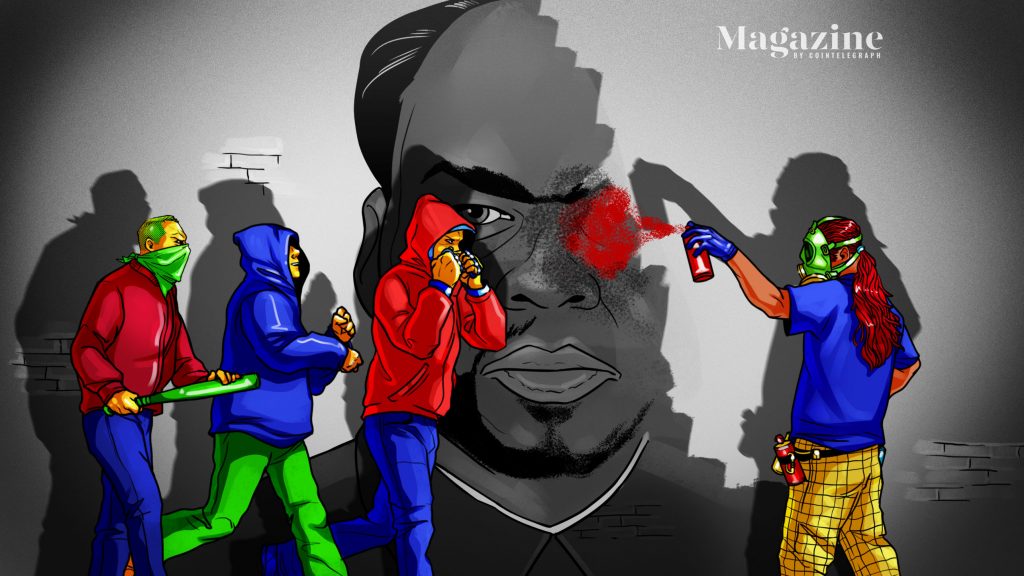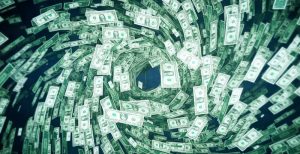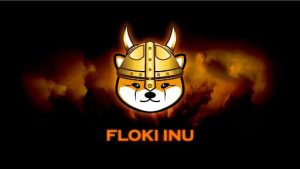A decade of ass-whoopin’ and skullduggery in a single NFT – Cointelegraph Magazine

Lushsux’s street art is celebrated by Banksy and Beeple; his NFTs have made millions; and he has a landmark auction planned for a “major auction house” next March — but he’s still very much a man of the people.
The artist is showing me around his studio warehouse in inner-city Melbourne but gets concerned when I point my camera in the vague direction of his beaten-up old Ford. The anonymous artist is worried that I’ll inadvertently expose his location to other graffiti crews who hate him.
“Do me a favor and don’t shoot the car in the front because I’ll have some c— come round here and try and stab me. I’m not kidding,” he says.
“They’ll work out where it is — trust me — and I’ll get some psycho c— come around.”
Lush (that’s how everyone refers to him, as “sux” was a late addition) has been beaten up by other writers before, most famously in connection with a series of murals of rapper 50 Cent.
As the somewhat true, somewhat invented, story goes, Fiddy was getting increasingly upset with Lush’s murals mashing up his face with Taylor Swift (Swifty Cent), Donald Trump (The 45 Fif President) and Mike Tyson (50 Thent). The rapper reposted that last mural to his 11.8 million followers, telling them that it showed Lush needed “an ass whoopin bad.”
Soon afterward, Lush did indeed get an ass-whoopin’ bad, and he posted a picture reply to Fiddy of his bloodstained hospital bed. However, Lush graciously blamed “violent video games” and not the rapper.
Lush explains that he’s brought in some weightlifting equipment to the studio so he can pump iron in preparation for next time.
“I got beat up,” he says. “Someone was hitting me with a metal pole in the shoulder, so I brought my stuff back in so I could get back in it.”
Lush does not look like much of a fighter, even though he’s a big guy in a death metal T-shirt that exposes his tattoos. The image is somewhat undercut by a ponytail, jaunty-looking pants and softly spoken manner. He says he’s not planning to get into fights if he can avoid it:
“It’s not worth it. It’s funny man, karma. There’s always someone bigger and more junkie than them.”
Provocateur
Lushsux is what Australians call a “shit-stirrer” who loves to provoke a reaction, good or otherwise. He calls it “strategic trolling” and bills himself on Twitter as “the world’s first and therefore best meme artist.”
He spray-painted a dead horse for one London exhibition opening and set up a wrestling deathmatch so that Jesus and Satan could fight it out in a cage at another. In 2017, he painted a huge mural of Donald Trump on the West Bank separation barrier in Israel, referencing the president’s “build the wall” plan for the Mexican border. He’s an equal opportunity trouble maker, though, also getting reamed/celebrated for controversial and supposedly sexist takes on Hilary Clinton and Kim Kardashian.
Earlier, Elle Anastasiou, who works with Lush on his nonfungible token (NFT) platform, DRP.io, explained that the loudmouth internet persona was mostly an act. “He’s very much more quiet in person, so I need to do all the talking,” she says.
Lush concedes that “it’s misdirection,” adding, “Lush doesn’t have to be me, like my government name, type, and personality, you know what I mean?” he says. “I’d rather have fun with it.”

Locked down, while NFTs go up
Melbourne is still in the grip of the world’s longest lockdown, which will have hit 263 days by the time it is finally lifted on Oct. 22. Unfortunately, defacing public property is not one of the “Four Reasons to Leave Home,” so he’s been mostly confined to painting in his warehouse for the duration.
There are stacks of canvases in one corner, and he’s recently been working on a Joaquin Phoenix Joker NFT drop and a large Bored Ape picture that he painted for a friend who owns the actual NFT.
Three enormous murals of Facebook CEO Mark Zuckerberg are on the far wall. I’d watched him paint one live on Twitter earlier, muttering darkly about Zuck being a “bloody lizard” and complaining that every time he paints the social media overlord, his Instagram posts mysteriously go missing. When he finishes a mural, he imports the picture into Adobe Premiere to jazz up the NFT with movement because “there’s more perceived value in it being animated. It’s kind of fun.”

“My formula is to combine viral moments with living memes, and that gets things popping,” he says. A signature Lush move is to find the most talked-about celebrity of the movement and combine it with some sort of meme in order to hijack social media algorithms. This works even better when the celeb takes part by reposting or engaging with the work like Fiddy did.
I spy one of the green posters that have been plastered everywhere around Melbourne in recent weeks. They’re up in various other places around the world and will also advertise “Famous Instagram Account” for sale on the billboard in New York City’s Times Square.
At present, no one knows whose account it is. “People have guessed Banksy, Ai Weiwei, Snoop Dog,” laughs Anastasiou.

Of course, the Instagram account in question is Lush’s, which has 900,000 followers and more than 1 billion likes. He’s selling all 4,500 posts from the account individually as NFTs, from pictures of his street art to his frequent shit posts.
After the NFTs build up a head of steam via secondary sales, the project will culminate in March next year in an auction of the entire account as “Token O” at Christie’s auction house. Well, that’s the plan they outlined initially at least. Anastasiou emails me later to say it’s just one of the “major auction houses” interested in his work. It’s a way of taking back control of his content from Instagram.
“You’re not getting technically paid from Instagram to post all this content. It’s almost a dead end. But I thought about this pool of content that I’ve worked on for the last 10 years plus. Why not turn that into a 10K project of sorts?”
Perfectly suited to crypto
As an anonymous troll with a cutting sense of humor who admits to dwelling in the badlands of 4Chan’s /biz forum, Lush is perfectly suited to crypto. He says he’s dabbled in taking Bitcoin for payments but never really got into crypto “because I’m not a numbers guy.”
That was until NFT researcher GT Sewell sat him down in July 2020 and explained the whole world to him. Lush says he was so excited by the concept he could barely sleep for two weeks.
“Once, he really got it in my head exactly what the hell it is. I had that, like, that moment where you kind of go crazy for a while about it, you know? Like that day, I just completely switched my whole, like, art practice towards this thing.”

At the time, a rare NFT might fetch $50,000 on Nifty Gateway, so he set his sights on getting accepted by the platform. He got the cold shoulder by contacting them directly, so he instead embarked on a deliberate campaign of painting famous crypto figures — the Winklevoss twins, Satoshi Nakamoto, Elon Musk and Shiba Inu — to attract some attention.
Although the Winklevi retweeted him, it wasn’t until he painted Beeple — the most successful NFT artist at that time, and 50X more successful now — that the strategy painted off.
“About two or three weeks later, he saw it and was like, ‘I love this. This is really cool. This is awesome. No one’s ever done anything like that.’ And I’m just chatting with him and trying to pick his brain about NFTs and stuff. And then magically, the next morning, I get an email back from the Nifty people. I’d have to say Beeple was the reason.”
Beeple’s “Everydays: The First 5000 Days,” which collated 5,000 pictures the artist created daily over 13.5 years and famously sold for $69 million, helped spark Lush’s Instagram idea.
“It definitely influenced my thinking. I had my mum ask me who Beeple was. That’s how big it was. They’re the sort of things that get your mind turning for sure. And eventually, like all these different things, I was thinking of sort of coalesced into the Instagram idea.”
A full-time artist since 2009, he’s put on 23 exhibitions and made a comfortable enough living, but NFT sales have seen him leap up the ranks of Australia’s best-paid artists. He’s already made 623 sales for 922 Ether ($3.53 million), and that figure’s only likely to increase as news of this latest project gets around.
“It’s pretty crazy,” he says. “I’d always made enough to travel and to stay alive. But now, all that hard work is paying off, and I’ve found an actual audience of people who are really interested in collecting the work. Because out in the real world, you’ve got to do a lot of weird stuff to try and make big money.”

Western suburbs kid makes good
Lush grew up in Melbourne’s industrial, working-class western suburbs and was a high school dropout, so he never studied art formally. He was working a shitty factory job when his boss told him he was destined for better things.
“He was an encouraging guy. He used to be a roadie for bands, and on my lunch breaks, I’d be drawing — anytime I had downtime, I’d be drawing — so, he’s, like, ‘Why are you here? You shouldn’t be doing this.’”
He set off to Hong Kong in 2009 and spent the next 10 years painting and traveling the world. “I just turned it into what I would do and just didn’t have a job from then apart from doing bizarre stuff.”
In 2013, he was the only street artist invited to the Melbourne Now showcase at the National Gallery of Victoria, and a year later, Banksy invited him to take part in his Dismaland: Bemusement Park exhibition.
“About then, was when I was like, ‘I better start doing art,’ you know?” he says. “I was always interested in viral stuff or memes and so forth. I didn’t really paint a lot of it until that moment.”
“That was the sort of pivotal moment where I was like, ‘I’m gonna take this a little more seriously.’”
He’s often described as Australia’s Banksy — which he thinks is just lazy journalism — but concedes there are some similarities in the way they built up mass audiences via technology and creating media stunts.
“Why do something for a limited audience or just one subset?” he asks. “That’s what I feel like Banksy does, creates stuff that anyone can kind of interpret and get a laugh out of.”
“He reaches a mass audience. So, that’s the kind of stuff I was influenced by, in terms of his work, you know?”

Manipulating the media
Around the time of the Dismaland show, Lush says he read a book about media manipulation and art and set out to try it himself after Kim Kardashian “broke the internet” for a second time in 2016 with a totally nude selfie. Lush immediately plastered her over the largest wall he could find and then set about making it a news story.
“I started emailing and calling as many news outlets as I could find, saying that I was the next-door neighbor and that I was not happy with it because now I have to look at her every day across the road.” A conservative talk-back radio station picked it up, then the story went viral. “If it hits the AP, or Reuters or whatever, then you get a worldwide news story out of it.”

He tried a similar trick later that year by painting Hilary Clinton as a pole dancer in a stars and stripes bikini. A mass reporting campaign from Reddit saw his Instagram account suspended, so he shopped the story to every journalist he could think of. When the local council demanded the removal of the “offensive” artwork, he painted over it to put Clinton in a burqa, which added more fuel to the story.
“Generally, when I’ve got things successful, it’s just through a bit of skullduggery, like, creating some sort of story for them to run with a narrative to it, and just yet, continuing it on as long as I can.”
This could be seen in his supposed “feud” with 50 Cent.
“Obviously, he was just playing it up so people engage with the posts more. They actually loved it; they reached out to me early on and were, like, ‘We love it, keep making stuff. We’ll keep posting and pretending we hate it.’”

Lush says he really was beaten up, but the incident had nothing to do with 50 Cent.
“I was out preparing a wall for the next day, and a group of these younger guys, graffiti guys, came up to me, being cheeky, and I ended up in a fight with them. It was kind of a bummer. It was just a graffiti beef; it’s just part of the culture. It wasn’t explicitly anything to do with Fifty — that’s what’s funny.”
NFTs forever
For Lush, NFTs are the beginning of something as massive as the dot-com boom.
“Right now, we are 100% living in this NFT boom, and I’m glad that I really went for it. It’s just this is just too cool not to not to have done that.”
One aspect he loves is the fact he can interact with collectors directly.
“All you have to do is contact them and say thank you and build a relationship early on. Whereas sort of the traditional art world the galleries are there to sort of basically sort of cock block you from, from getting to know any of those people buying… because that’s how they make their money.”
Unlike Banksy or Jean-Michel Basquiat, Lush doesn’t feel as if he’ll ever be accepted by the more serious art circles — and he doesn’t really care.
“I don’t think I’ve ever really been 100% recognized by those people,” he says.
“But now with the NFT stuff and all that jazz, it is not that much of a big deal to be recognized in that world to me. I’d rather be more recognized in this new emerging world, to be honest with you.”
The Lushsux Instagram posts drop starts on drp.io from Oct. 23.
















